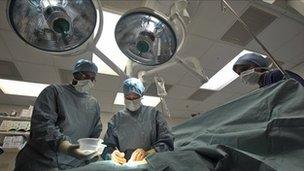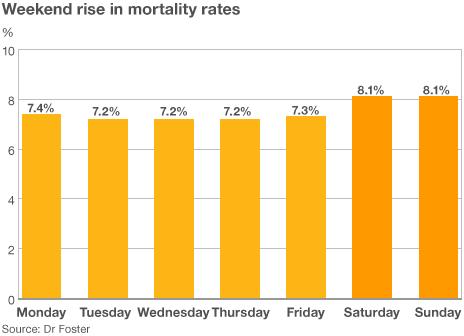Hospital patients 'more likely to die at weekends'
- Published

A shortage of senior doctors is said to be at the heart of the problem
Being admitted to hospital in England at the weekend is risky, experts say.
Research company Dr Foster came to this conclusion after finding a "worrying" 10% spike in deaths compared with weekdays across 147 hospital trusts.
It said some deaths could have been avoided with better staffing and access to services such as diagnostics.
The review, external also looked at performance overall, warning death rates appeared to be higher than they should be in more than a quarter of trusts.
Dr Foster, which works closely with the Department of Health, said its findings needed to be investigated urgently.
The data was published in the group's Hospital Guide, which has been produced yearly for the past decade.
It looked at death rates using four measures - deaths in hospital, deaths in hospital and within 30 days of discharge, deaths linked to low-risk conditions and deaths after surgery.
In total, 42 trusts had higher than expected mortality rates on at least one measure, of which at least 22 were flagged up in two categories and two in three.
On the weekend performance, Roger Taylor, director of research at the group, said a shortage of senior doctors was at the heart of the problem.
"It's about having the more experienced staff in the hospital, looking after patients out of normal working hours.
"The junior doctors, they're always around, but they're not the ones making a difference here."
'Pretty stark'
He said almost every hospital in the country had a higher death rate at weekends, but a small number had seen a "really significant rise".
And he urged hospitals to make sure they always had sufficient cover so that patients got to see the right doctor all the time.
"It's not a simple problem to solve, but we do need to solve it," he added.
Access to key services like diagnostics was also highlighted as a factor.
However, it was acknowledged that some of the deaths were unavoidable as people who were at the end of life were more likely to be admitted to hospital at the weekend.
This is because community services which they would have relied on if they had been close to death during the week would not be available.
Overall, 8.1% of those admitted at weekends died compared with 7.4% from Monday to Friday, once those having elective operations such as hip and knee replacements were discounted.
The report concluded weekend treatment was "risky".
RCN chief executive Dr Peter Carter said NHS trusts needed to look at their staffing levels as a "matter of urgency".
"Due to the complex needs of many older people, having staff with the right mixture of skills and experience on the ward is vital," he said.
"Equally, it is both risky and irresponsible to expect two nurses and four healthcare assistants to safely look after 59 elderly patients as the report found at one hospital.
Roger Taylor from Dr Foster: "It's very worrying"
"We need to see proper planning systems, based on sound clinical evidence, in order to ensure safe nurse staffing levels for patients."
Katherine Murphy, chief executive of the Patients Association, said she was "appalled" by the findings.
"Patients deserve safe, effective care no matter what the time of day is. They deserve nothing less," she added.
Richard Hamblin, of the Care Quality Commission, which regulates standards in the NHS, said it was "too simplistic" to conclude high death rates were definitely down to poor care.
But he agreed trusts needed to look at their performance on the back of this report.
"Trust boards should use it to ask themselves serious questions about the quality of their services," he said.
NHS medical director Prof Sir Bruce Keogh said: "Mortality rates in the NHS are going down, but hospitals with high rates and poor outcomes in the evenings and at weekends must investigate.
"I will be asking the NHS medical directors to look closely at weekend services to ensure patients admitted at weekends receive the same standards of care as those during the week.
"This problem is not unique to the NHS, it confronts all health systems in the world, but I am confident the NHS is well placed to address these issues."

- Published28 November 2011
- Published21 September 2011